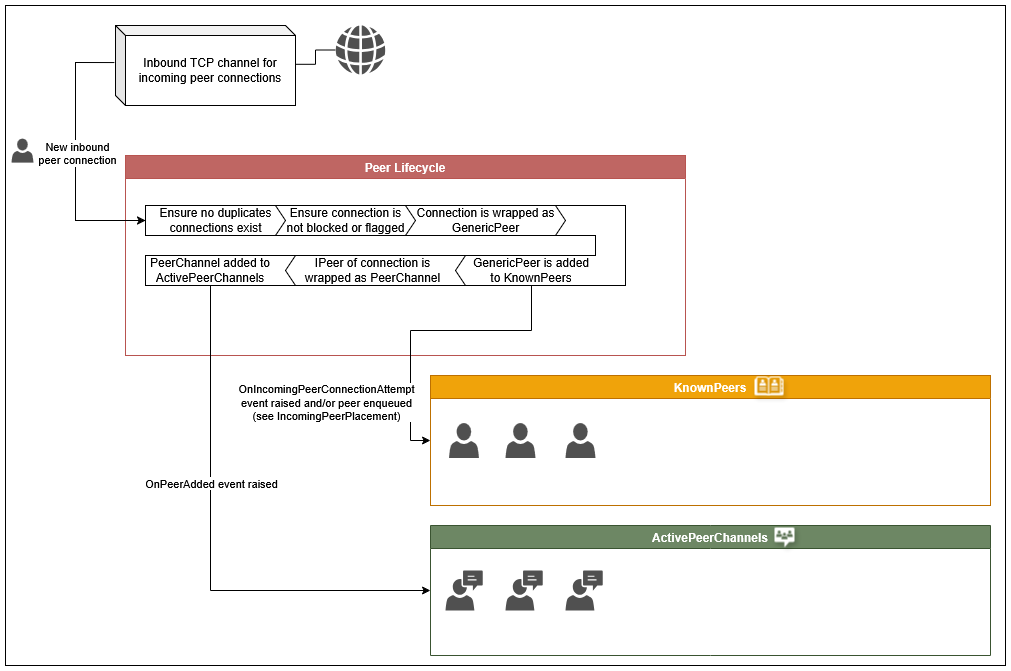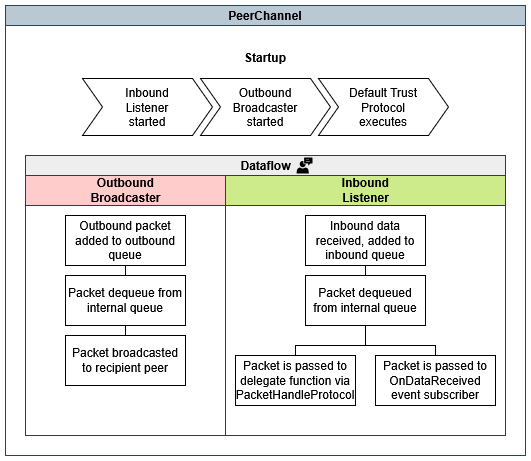Peers 👥
Peers are representative of client users within the peer network. When a connection is established to a peer through the TCP listener, the connection by default is wrapped in an instance of the GenericPeer implementation of IPeer and the PeerChannel which stores an IPeer implementation.
The IPeer interface defines the essential properties and methods for a peer, including the IP address, port, TCP client, network stream, and a unique identifier. The GenericPeer class provides a default implementation of the IPeer interface, encapsulating the peer's IP address, port, TCP client, and network stream. It also includes a unique identifier for the peer, which can be used for whitelisting and blacklisting peers in the network.
The PeerChannel class represents a communication channel with a peer in the P2P network. It manages the sending and receiving of data packets, handles connection retries, and maintains the state of the communication channel. The PeerChannel class also includes methods for opening and closing the channel, as well as handling incoming and outgoing data packets. The PacketHandleProtocol class stores the Action delegates for each packet type, and the PeerChannel will invoke these by default depending on the respective data packet type.
Peer Lifecycle
The lifecycle of a peer in the P2P network begins with the discovery and connection phase. When a new peer is discovered, the handler checks if the peer is a valid connection. If the peer is a new connection and not duplicate, and is also not blocked, it will be wrapped in an instance of the GenericPeer class and depending on the IncomingPeerTrustPolicy.IncomingPeerTrustPolicy value, will be either enqueued and/or passed to the event OnIncomingPeerConnectionAttempt by the InboundConnectingPeersQueue, then finally will be added to the KnownPeers list.
Once the connection is established, a PeerChannel is created to manage the communication with the peer. The PeerChannel handles the sending and receiving of data packets, connection retries, and maintains the state of the communication channel. The PeerChannel will then be added to the ActivePeerChannels list. The PeerChannel also invokes the appropriate Action delegates from the PacketHandleProtocol class based on the type of data packet received. This ensures that the correct actions are taken for each type of data packet, facilitating efficient and reliable communication between peers.

There are some trust policies under IncomingPeerTrustPolicy that can slighly modify the initial behavior of the established PeerChannel
AllowDefaultCommunication- as the name implies, allows default communication between peers to exchangePureMessagePacketsandDisconnectPackets. Default is true.AllowEnhancedPacketExchange- determines if peers will be trusted to exchange all other packet types, such asDataTransmissionPackets, which contain binary data such as files and network-related tasks. Default is false.RunDefaultTrustProtocol- determines if, upon opening the peer channel, the default routineIncomingPeerTrustPolicy.DefaultTrustProtocolwill be invoked to determine if the peer is a truster member of the network or not
If you intend to erect a more secure and private network that will leverage encryption or certificates for identification, you might set AllowDefaultCommunication to true, AllowEnhancedPacketExchange to false, and RunDefaultTrustProtocol to true. You would then devise a multi-step method called PeerTrustHandshake that takes a PeerChannel parameter. For example, the method would exchange a few PureMessagePackets for some kind of handshake, temporarily elevate the trust level of the peer, then swap a DataTransmissionPacket to exchange a key or signed message. Then confirm whether to keep trust elevated, or to demote trust and then proceed to end the connection with the peer. Then you would set the IncomingPeerTrustPolicy.DefaultTrustProtocol delegate to the PeerTrustHandshake you just made.
Peer Channel
The PeerChannel is a managed wrapper for the connection with the peer. It is designed to handle the inbound and outbound relay of data and information, control accessibility and permissions, and safely handle other network logic. Much of the logic uses delegates in order to remain modular for development needs.

This is the list of delegates in the PacketHandleProtocol class that the PeerChannel uses for handling different types of packets. These are all Action< string > delegates, where the string is a JSON serialized form of the packet:
| Name | Description |
|---|---|
| PacketHandleProtocol.HandleIdentityPacketAction | The default delegate for handling inbound IdentityPackets. |
| PacketHandleProtocol.HandleDisconnectPacketAction | The default delegate for handling inbound DisconnectPackets. |
| PacketHandleProtocol.HandlePeerGroupPacketAction | The default delegate for handling inbound peer CollectionSharePackets. |
| PacketHandleProtocol.HandleDataTransmissionPacketAction | The default delegate for handling inbound DataTransmissionPackets. |
| PacketHandleProtocol.HandlePureMessagePacketAction | The default delegate for handling inbound PureMessagePackets. |
These all have default implementations that can be overridden. The PeerChannel will always pass packets to the respective delegate, regardless if the OnDataReceived event is subscribed to and utilized. If you want to handle all inbound data through the OnDataReceived event, you will need to create empty filler methods that simply do not preform any actions and assign them to override the default delegates.